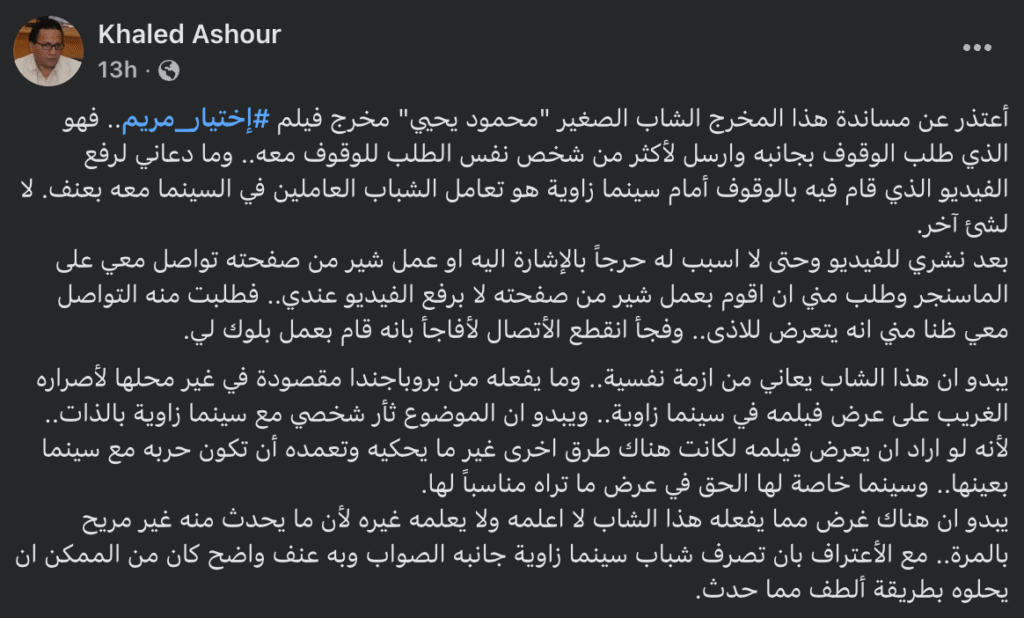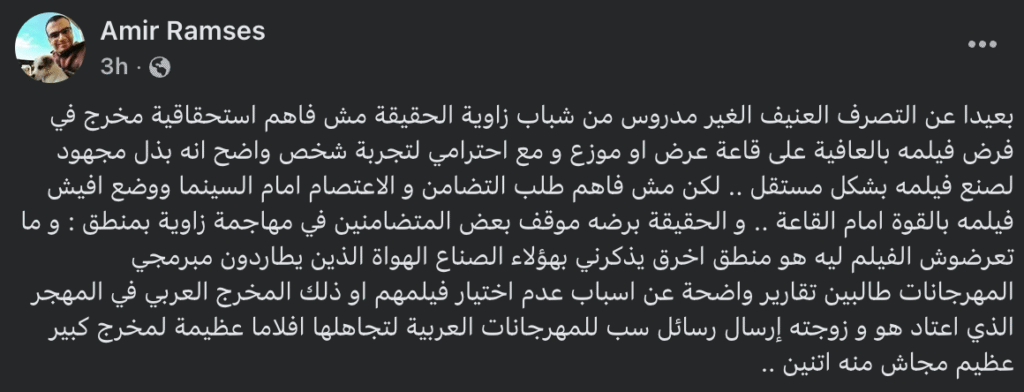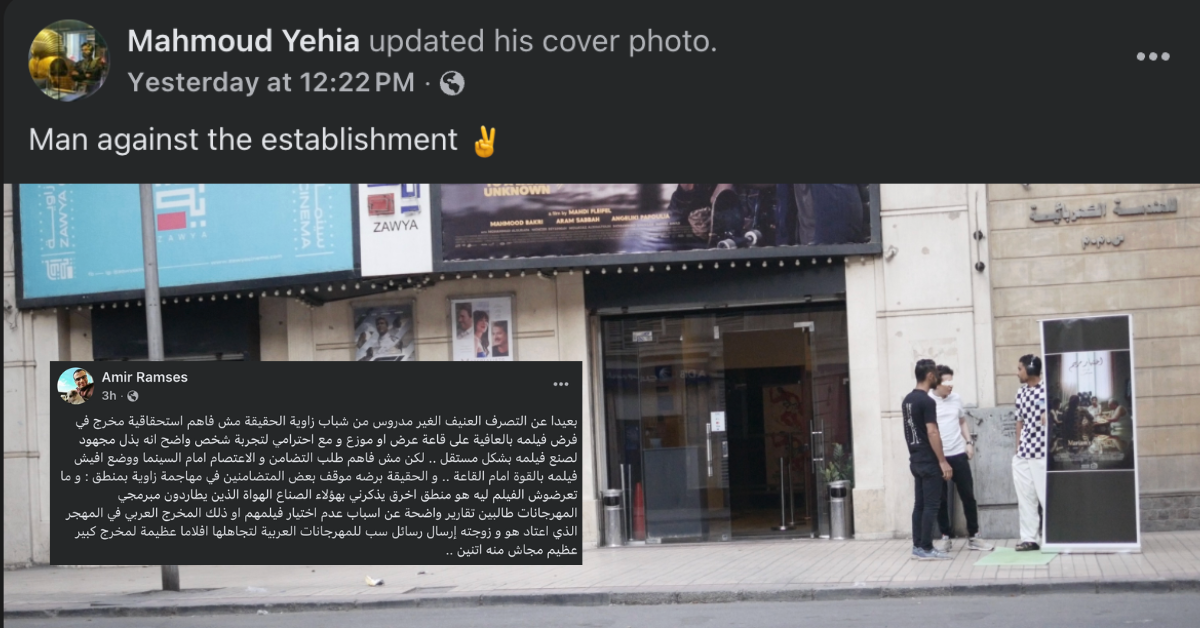A confrontation at Cairo’s Cinema Zawya between filmmaker Mahmoud Yehia and staff escalated into a public protest and a social media storm. But is this really a case of censorship, or just a clash between expectation and reality?
From Refusal to Protest
Mahmoud Yehia, writer, director, and producer of the award-winning film Mariam’s Choice, visited Cinema Zawya carrying a poster and a stand for his film. He asked the staff to screen it.
When they refused, he continued to demand an explanation, insisting on a reason why the cinema wouldn’t show his film.
After being refused again, he set up his poster outside the cinema in a spontaneous protest. This is when the confrontation turned physical.
Yehia says the staff injured his finger and broke the poster stand while kicking him out.
He later shared what happened online, accusing Zawya of silencing his work and calling on others to pay attention.
Social Media Uproar, and Divided Reactions
The story gained momentum when film critic Khaled Ashour posted a video condemning what he called Zawya’s “shameful and aggressive” treatment of a young filmmaker.
Many initially rallied behind Yehia, praising his determination to fight for a screening.
But the conversation quickly split. Some supporters stood by him, sharing his protest video and demanding that Zawya give his film a chance. Others began to question the approach.
Ashour himself later retracted his support, writing that Yehia had personally contacted multiple people asking for backing and then blocked him after they spoke.

He described the campaign as “propaganda” and suggested it had turned into a personal vendetta against Zawya rather than a broader industry issue.
“Man Against the Establishment”
Yehia leaned into the moment, framing his actions as a stand for young filmmakers against an industry that refuses them space.
In a statement posted online, Yehia described the situation as:
“I am currently in an unequal battle with those in charge of screening and distribution in Egypt, those in charge of Zawya Cinema in particular, against attempts to bury my film and ban it from theatrical release without any censorship or political justification, and without providing any reasons.
My financial investment, four years of hard work, and my entire cinematic and artistic future are at stake, and therefore, I need your moral support. Please watch to the end and share this video.”
The statement positioned his refusal as an intentional attempt to suppress his work, framing the conflict as larger than just one cinema’s programming choice.
Industry Pushback
Not everyone agreed. Director Amir Ramses criticized Yehia’s actions, saying:
“I respect the effort he put into making his film independently, but forcing your way into a cinema or staging protests is not the way.
This is similar to when directors criticize festivals for rejecting their films. It doesn’t help anyone.”

Others echoed that sentiment, pointing out that cinemas set programming months in advance and that front-of-house staff can’t change the schedule.
Turning a refusal into a confrontation and protest risks alienating one of the few spaces that regularly support indie films.
A Real Problem, The Wrong Fight
There’s no denying that indie film distribution in Egypt is a challenge. Mariam’s Choice has won awards internationally at smaller festivals, and Yehia’s frustration is understandable. He spent years and his own personal money making this film, and the international recognition — even if it’s at humble festivals — seems to have convinced him it deserves a commercial run at home.
But international acclaim doesn’t guarantee local box office success.
Many films that tour festivals never get theatrical distribution, not just in Egypt but worldwide. And we’re talking actual big-name festivals, with some of the biggest filmmakers behind them.
Commercial screenings depend on programming schedules, audience demand, and business considerations, rather than solely on artistic merit or awards.
But Zawya is a private cinema with the right to curate its lineup. Walking in with posters, demanding a screening, and then escalating to a protest when refused doesn’t fight the system — it risks burning bridges with the very places indie filmmakers need.
This Wasn’t Naivety
Mariam’s Choice isn’t just a film making the festival rounds on its own. It’s listed on MAD Solutions’ website, which means the company handled its international festival distribution.
For those unfamiliar, MAD Solutions is one of the leading film distribution and PR agencies in the Arab world.
They specialize in getting independent Arab films into festivals, arranging theatrical releases in multiple countries, and handling publicity campaigns.
That means Mahmoud Yehia is not an outsider who doesn’t know how distribution works — he has already worked with an agency to get his film seen internationally.
If MAD Solutions didn’t pitch the film for a local theatrical run, there are two possibilities:
- They didn’t see commercial potential for a local release, which is a strategic call they’re allowed to make.
- Or they didn’t handle the local rollout at all, in which case the issue is between Yehia and his distributor, not Zawya.
Either way, it doesn’t justify walking into a cinema and demanding an immediate screening.
Yehia used professionals to get international acclaim but skipped the same process in Egypt, assuming his festival CV would be enough to secure a commercial screening.
The Hard Truth: No One Owes You Anything!
Cinemas don’t owe filmmakers anything. No business will intentionally lose money just to “bury” a film — that’s victim mentality and conspiracy thinking. If a young director truly wants their film seen, there are many ways to make that happen.
Director Karim Shaaban has been winning awards for films and commercials for years. Yet, he releases his short films on YouTube, where audiences have celebrated them. His short film, Nightshift, has garnered over a million views alone! There are also plenty of streaming platforms willing to acquire indie films.
Instead of targeting one of the very few venues that consistently support indie filmmakers, Yehia turned Zawya into the villain. But fighting the wrong fight doesn’t build a healthier film ecosystem — it just creates more hostility between filmmakers and the few spaces that actually try to help them.
The Conversation We Should Be Having
Instead of targeting individual cinemas, the emphasis should be on solutions, such as increasing screening spaces, providing more cultural backing for independent films, and hosting events that build genuine audiences for smaller titles.
When the fight becomes personal, the bigger issue — creating a fair, sustainable path for indie films to be seen — gets lost. Passion is necessary, but strategy matters more.





